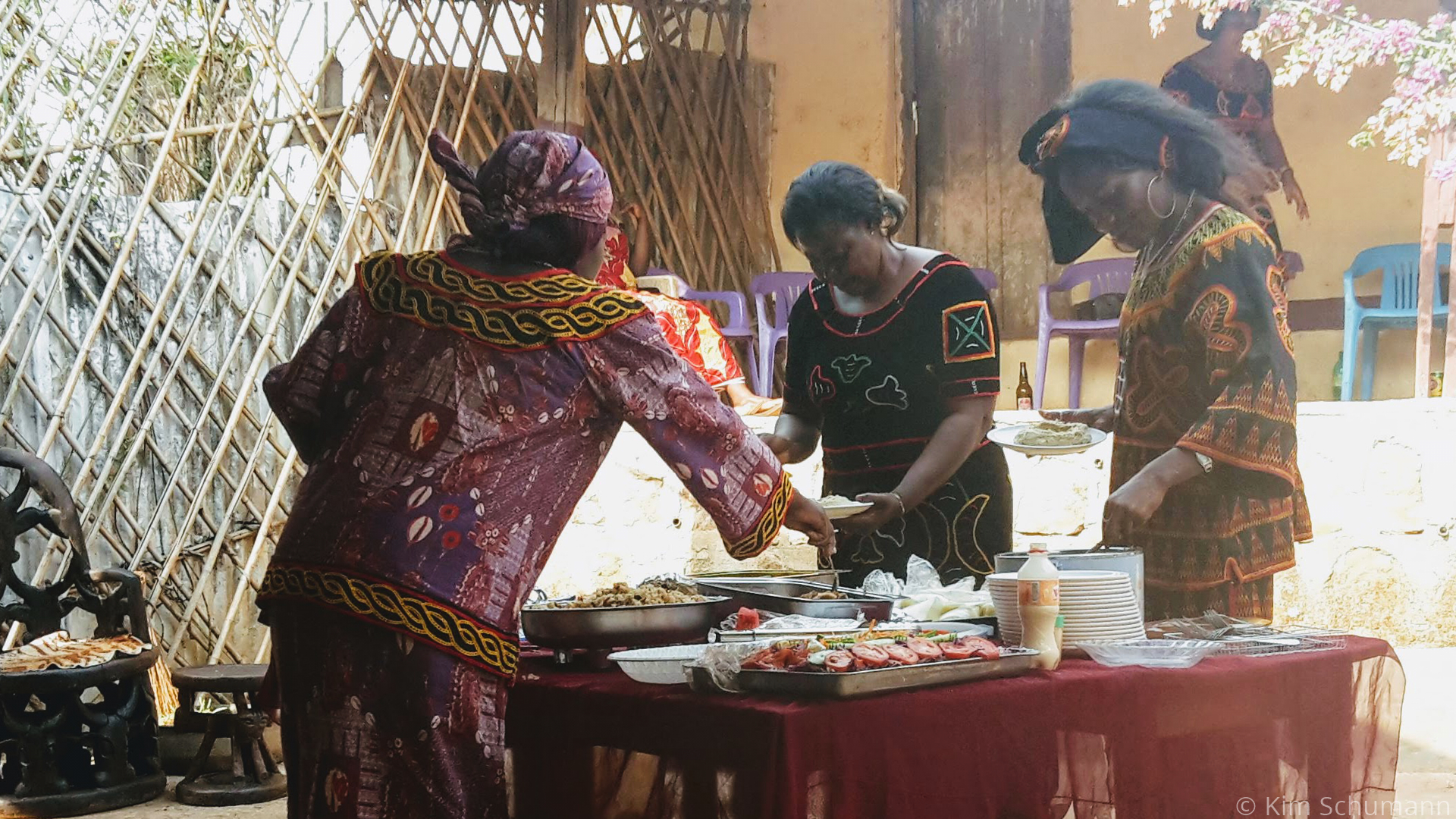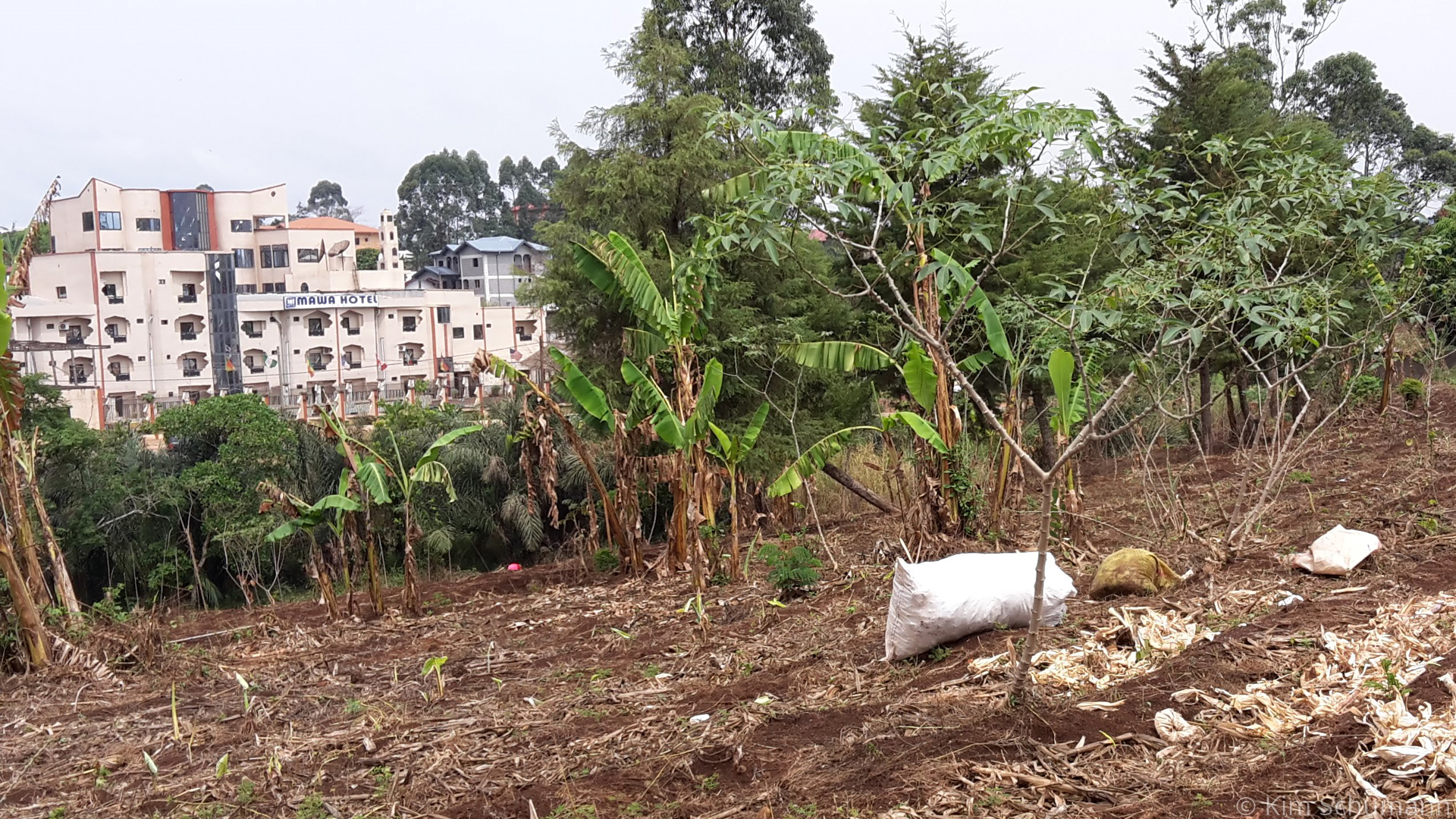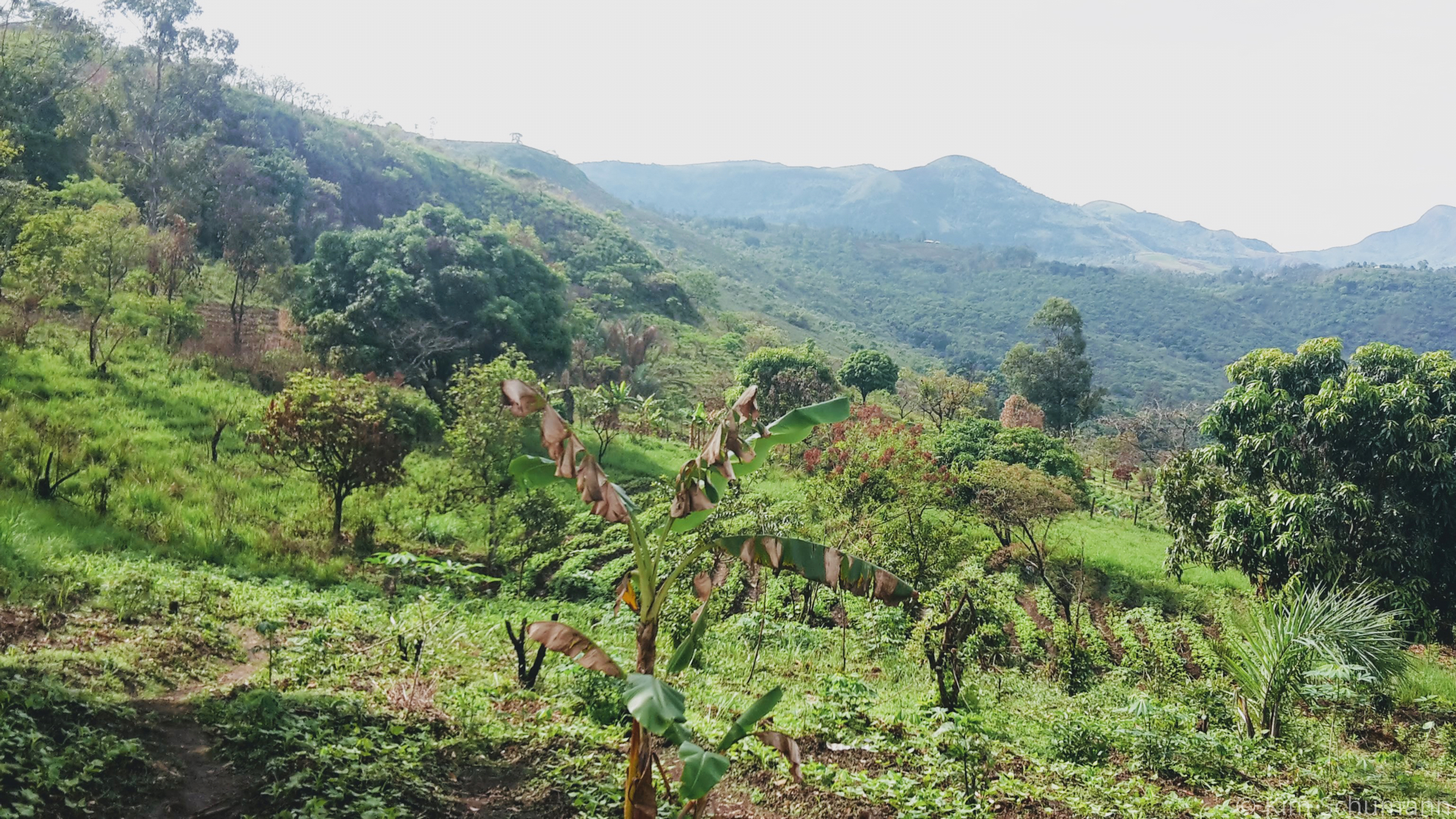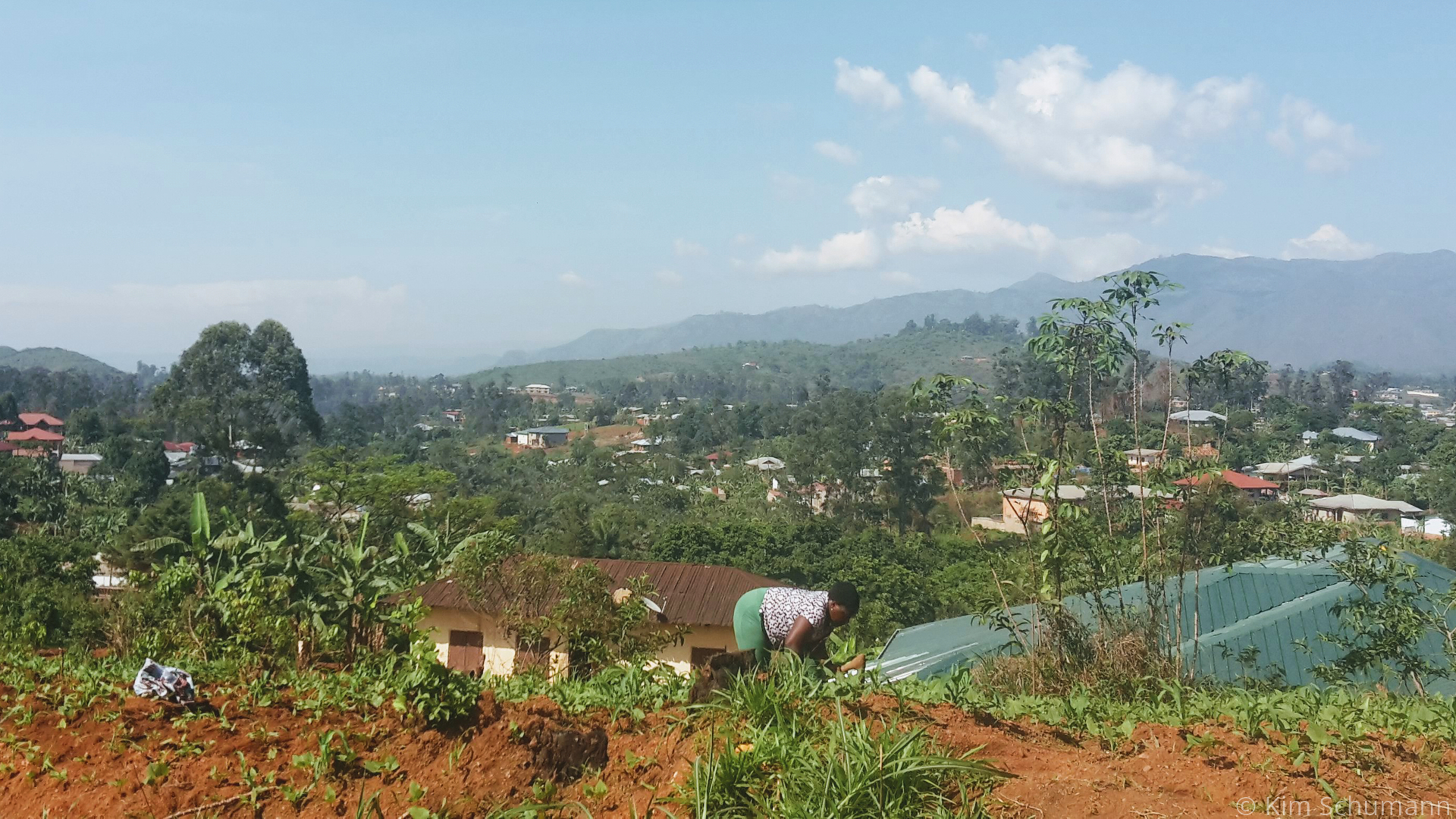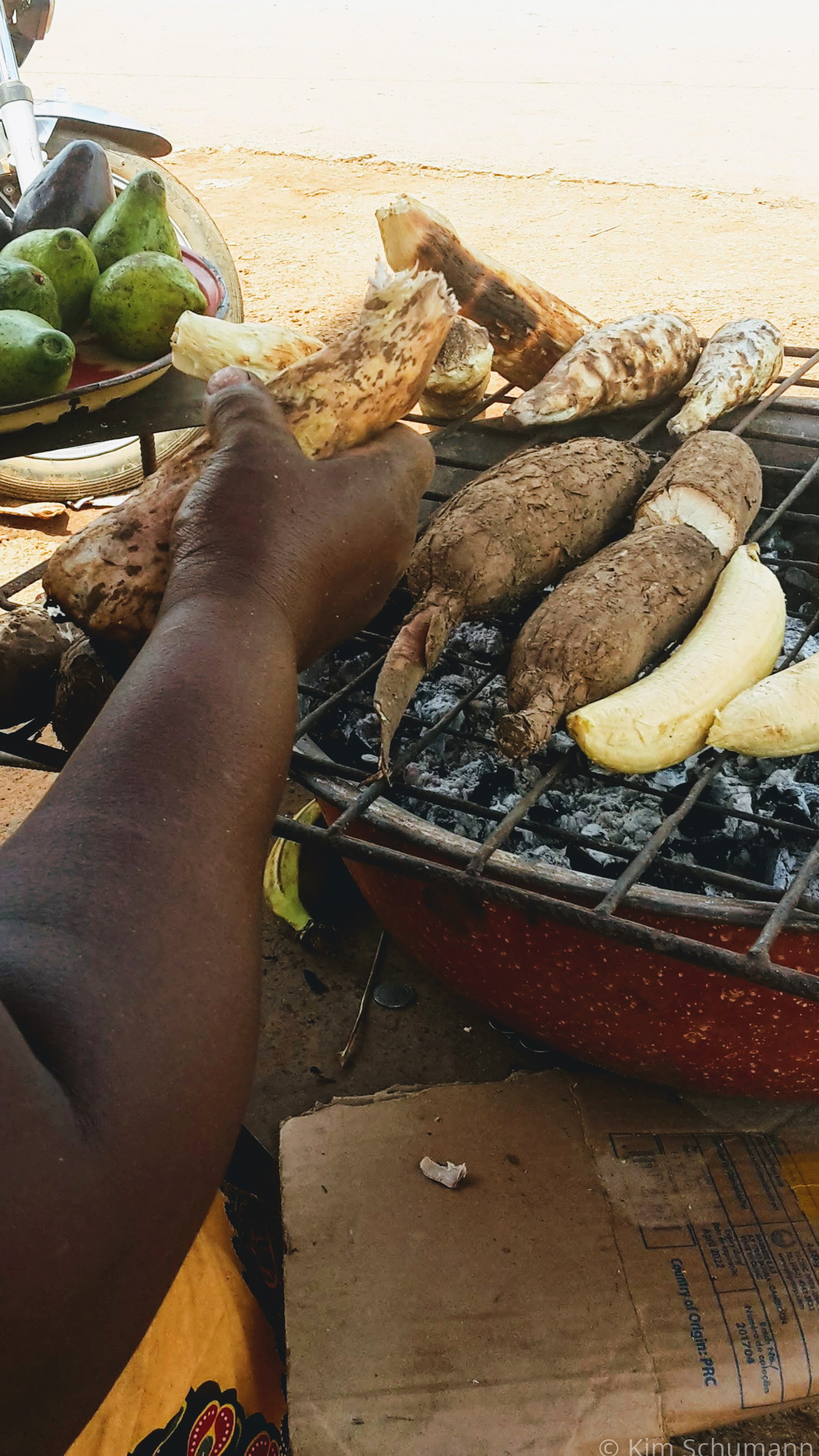by Kim Schumann
During February and Mach of 2018 I was conducting ethnographic research in Bamenda, Cameroon, for my master’s. My thesis project was supported by the research programme Urban Food Plus and was aimed at exploring sociocultural aspects of food security from a consumer’s perspective.
In the following, I am going to reflect on my experience doing anthropological fieldwork for the first time. I am going to go over aspects that went well or not so well and hypothesise about possible reasons, hopefully with the result of generating insights that will be helpful for future projects. Since this is an introspective text, I decided to play fast and loose with the conventions of academic style and simply express myself in a way that feels authentic.
Buffet at the Bambui Palace
Not the kind of field work I expected – Urban farming in Nkwen
Farm land in Nkwen – The picture cannot even capture how green this scene is
Gardening by the road side in Nkwen
Street food vendor roasting plantains and cassava
“Over the past two months I had grown up so much.”
First of all, I would like to point out that I am glad I did it. Upon returning from Bamenda I joked about how I am worried that if I stay in anthropology for too long, it is going to age me – because over the past two months I had grown up so much; I must have gained several years of life experience.
In hindsight, I also have to admit that I have no idea what compelled me to go in the first place. While I had some experience in traveling alone from an internship in Uganda during my bachelor’s degree, that experience was also what made me decide to focus my studies on Europe and to never go back to Africa. And that journey did not even involve 8 hour bus rides – to be organised by me (not speaking any French whatsoever) in a francophone city – or being in a conflict area. So, the entire decision was very unlike me but I assume I saw a fleeting opportunity to prove my competence as an aspiring anthropologist and took it without letting myself give it much of a second thought. I remember thinking about the project as a form of testing myself: If my research ends up a total disaster due to me being the reserved introvert I was convinced I was, I should seriously reconsider my plans of an academic career in anthropology. Luckily, at least by my own standards, I passed the test.
“Are you trying to get yourself killed?”
In the next few paragraphs I would like to go over some things I expected to be problematic or difficult during my research that, surprisingly, turned out not to be. After that, I will move on to discuss the problems I actually faced and then, to end on a positive note, present what I learned in the process.
There were a number of things I was worried about while preparing for my field stay. One of them, which is probably a reasonable thing to be worried about, was the Anglophone Crisis and, as a result, my safety. I had tried to inform myself about what was going on in Bamenda at the time but news does not filter through reliably. I remember, upon arriving in Douala, receiving a message from Annika Witte, notifying me about current upheaval, reminding me that I could reconsider my decision, and advising that I ask people in Bamenda if it was really safe for me to come. A young man in the hotel, hearing of my travel plans, looked at me with big eyes and asked “Are you trying to get yourself killed?”.
“The crisis and its ramifications are a fact of daily life in Bamenda that you learn to cope with or you do not.”
In the end, while the curfew and ghost town days were a hindrance to my work, at no time did I ever feel acutely unsafe in Bamenda. However, I cannot fail to mention that I frequently heard gunshots, not just during curfew hours. I occasionally heard rumours of people getting shot and in one instance I can confirm them because I was there. In those moments when the latent conflict manifested itself, it was certainly upsetting. But again: I did not fear for my own safety.
It is difficult to leave this topic now and compare it to benign personal struggles like homesickness, especially since at the time of me writing this, the situation in Bamenda and the entire North West and South West region has gotten so much more severe. But as tragic as this is to realise: The crisis and its ramifications are a fact of daily life in Bamenda that you learn to cope with or you do not, the latter leading to feelings of helplessness and frustration. While the first option is better to stay functional as a researcher and a person, it comes with occasional feelings of guilt for not being outraged about what you witnessed. Even though this was difficult to deal with, it certainly helped me to have people to talk to about what was going on, both inside Bamenda and back at home; acknowledging the atrocities and our feelings, but then also moving on.
“Maybe sometimes removing yourself from your usual environment allows you to explore patterns of thought and behaviour that might not fit ‘who you are’ at home.”
“Back home” is a good transition into the next concern I had: Badly wanting to be back home and having that urge for the entirety of two months might have been my biggest fear. That was what I had experienced in Uganda and it was a paralysing, painful feeling to carry around. But then, when I first arrived in Cameroon, I ended up being so stressed (in a positive way); so wired and focused on finding my ways around and getting everything set up, that it did not even occur to me that I might want to start feeling scared or lonely or crave the comfort of my home. After that initial phase, I had no need to feel scared or lonely because I had pleasant company most of the time. I am not particularly known for being outgoing or socialising a lot but I am glad I somehow magically pulled that trait out of my sleeve at the right time. I was even complimented by my research partners on how I was a very social and open person and easy to interact with. I have come to think that maybe sometimes removing yourself from your usual environment allows you to explore patterns of thought and behaviour that might not fit “who you are” at home. Additionally, knowing that my research results depended on it was certainly a good motivator to go out and interact with people even when I might have had reservations or fears in the back of my mind. Some of those newly acquired social skills fortunately made it through airport customs and I got to take them home with me. Most notably, I learned to ask questions (for example in class or at the workplace) and try new things without being deathly afraid of looking stupid or failing. I would go as far as to call “getting over yourself” and “asking questions” anthropological soft skills. You need to practice them just like taking field notes – which takes me to my next point: Things that actually turned out to be problematic.
“I would go as far as to call ‘getting over yourself’ and ‘asking questions’ anthropological soft skills.”
Having no experience in ethnographic fieldwork, apart from a few unauthentic preliminary exercises during my bachelor’s, it was to be expected that I would not have everything figured out. Luckily, fieldwork is an explorative trial-and-error process anyway so I think any anthropologist would agree that taking some time to grow into your role as a researcher is perfectly acceptable. I would sometimes catch myself asking a leading question – or no question at all – even though something was not actually clear to me. However, the thing I had to consciously work on the most was taking field notes. At first I was afraid of seeming impolite or disrupting the situation by pulling out a notebook. This lead to me handwriting my notes after the noteworthy situation, producing rather short, selective, not very detailed notes. With time, I grew more comfortable with note-taking. I tried typing along on my phone when something seemed particularly important or interesting to me. This had the advantage of being able to directly expand on and edit the notes later on so they would be understandable when I would analyse them weeks later. To do so, I experimented with voice recognition apps because I noticed that in talking I would recall more details and produce a better record. It was efficient because I ended up with a text document and I did not need to worry about keeping copies because I directly uploaded the files into a cloud. Towards the end of my research, I “rediscovered” handwritten notes. My research partners knew me by then and on some occasions I had written down specific information they were giving me and then just kept on taking notes, later realising that they were a lot more (in volume) and a lot more dense as well. I thus continued to have pen and paper ready to scribble down bullet points whenever I felt the need. The only downside to this was having to code these massive piles of text which frankly felt like a Sisyphean task. For future research, I would like to further explore different methods. I could, for example, see myself make use of technology to digitalise handwriting. In Bamenda, I already had a device with me that is supposed to do exactly that but I ended up mostly leaving it in my room because it was simply too unreliable and instead I went with the more low-tech processes just described.
“I felt dehumanised.”
I would like to bring on a completely different point now that was also troublesome for me: Attracting an excess of attention. Bamenda is not particularly flooded with white people and most certainly not with white women in their early 20s with very visible body modifications. I am well used to drawing stares and if that bothered me, maybe I should not be walking around with massive holes in my earlobes. However, not being able to take five steps outdoors without having somebody holler at me, make unsolicited compliments, very persistently try to make conversation, stick to my heels or even try to physically hold me back was a true test of my patience. I wish I was exaggerating. With time, I taught myself to block people out and sometimes I would simply put on headphones while walking somewhere. People would still be ridiculously pushy in trying to approach me but I would not hear them, thus avoiding complete frustration on my part. I am not a very fearful person and having a man follow me on my way home in the dark, trying to find out where I live, does not scare me – but it does make me incredibly angry, especially when I could not possibly be any more clear about wanting to be left alone. I felt dehumanised. It was exhausting. I do not want to say that I found an effective way of dealing with it because frankly it still bothers me. But I surely have become an expert in ignoring people and making random strangers my allies by asking them “Excuse me ma’am; this man keeps on harassing me. Will you please tell him to leave me alone?” as if it was the most mundane request.
“I learned a lot about the power of appearance and leaving the right kind of impression with the right kind of people.”
On top of this very direct presentation of the attention I got, and this was probably bothering me even more, there was also a lot of talk about me. No matter where I went, I could be sure that somebody would see me and tell one of the people I had close contact with that I was there and there with this and that person; usually with a man – or with that man (whichever person and whatever my actual relationship to them). I began joking about having celebrity status and about how you can never tell which of the rumours are true. Nevertheless, I started to worry that it might affect my reputation and thus my research. Luckily it never did. I learned a lot about the power of appearance and leaving the right kind of impression with the right kind of people. To me this sounds like an equally appalling and admirable competence to have. It certainly does come in handy in all sorts of daily interactions but additionally it provided me with insights into my research partners’ perspective: Their social networks were so much more tightly knit. On the one hand, they could rely on them; on the other, this cohesion was to be maintained through appropriate action. Social control mechanisms had a strong hold on them, manifesting in worries about what people might think about their diet or their clothes, their church attendance, their “white friend”. To me, having learned from an early age that you are not supposed to care too much about what other people might think about you, this seemed odd. Everyone seemed to be so stuck-up in gossip, dragging other people through the mud while deathly afraid of being seen smoking or having people notice their family quarrels. It took me about six weeks to wrap my head around this dynamic and the fact that you cannot escape it by not caring. Because not caring has real-world consequences.
“It took me about six weeks to wrap my head around this dynamic and the fact that you cannot escape it by not caring.”
This relates to my research interest because the realisation made me understand why my research partners would repeatedly bring up social dynamics as a hindrance to follow a diet tailored to their needs. I request special dishes all the time and to me it is slightly uncomfortable at worst (when I notice the host will feel bothered). But it will not be embarrassing and people will not be talking about it for months to come; how I refused my grandmothers special holiday dinner or had the audacity to go to the buffet twice and then only pick up vegetables. For them, swimming against the tide was not only tiring but was also expected to only lead you astray.
“Different things matter differently, depending on the cultural context.”
Different things matter differently, depending on the cultural context. That sounds way too obvious to point out but sometimes value systems can differ in surprising, seemingly insignificant places. And personally, in this case, I had to stumble over them, fall flat down and smash my face into them, figuratively speaking, in order to notice.
Describing it like this finally makes me feel like a “real anthropologist”; as if I am suddenly in on something. I have spent the past five years of my life reading about the great epiphanies researchers came to through failure, awkwardness, and embarrassment, praising these experiences as being the quintessential virtue of ethnographic fieldwork – and I was horrified and did not understand why these struggles would really be necessary.
Well, the account above shows why they are. So, I would argue that, for me, this research project did what it is supposed to do within the M.A. study programme: It gave me a real (but rather small scale and thus manageable) project, in a real setting, with real unknowns to explore. It allowed me to try and test research methods and use advice I had heard countless times in lectures and seminars. It made me remember “classics” I had read somewhat reluctantly and finally think “Ohh – that is what they were talking about!”. As a whole, it was at the same time a very humbling experience but also one forging confidence in my abilities.
Since I cannot possibly find a higher note to end on, I will wrap this up by saying that I am genuinely looking forward to writing my thesis and continuing my studies, making use of my newfound skills and perspectives.
